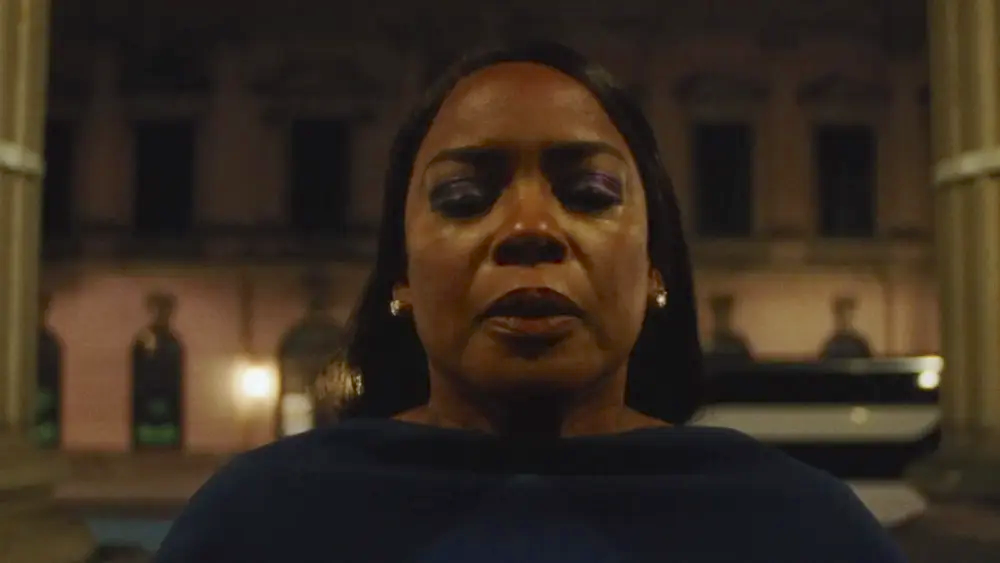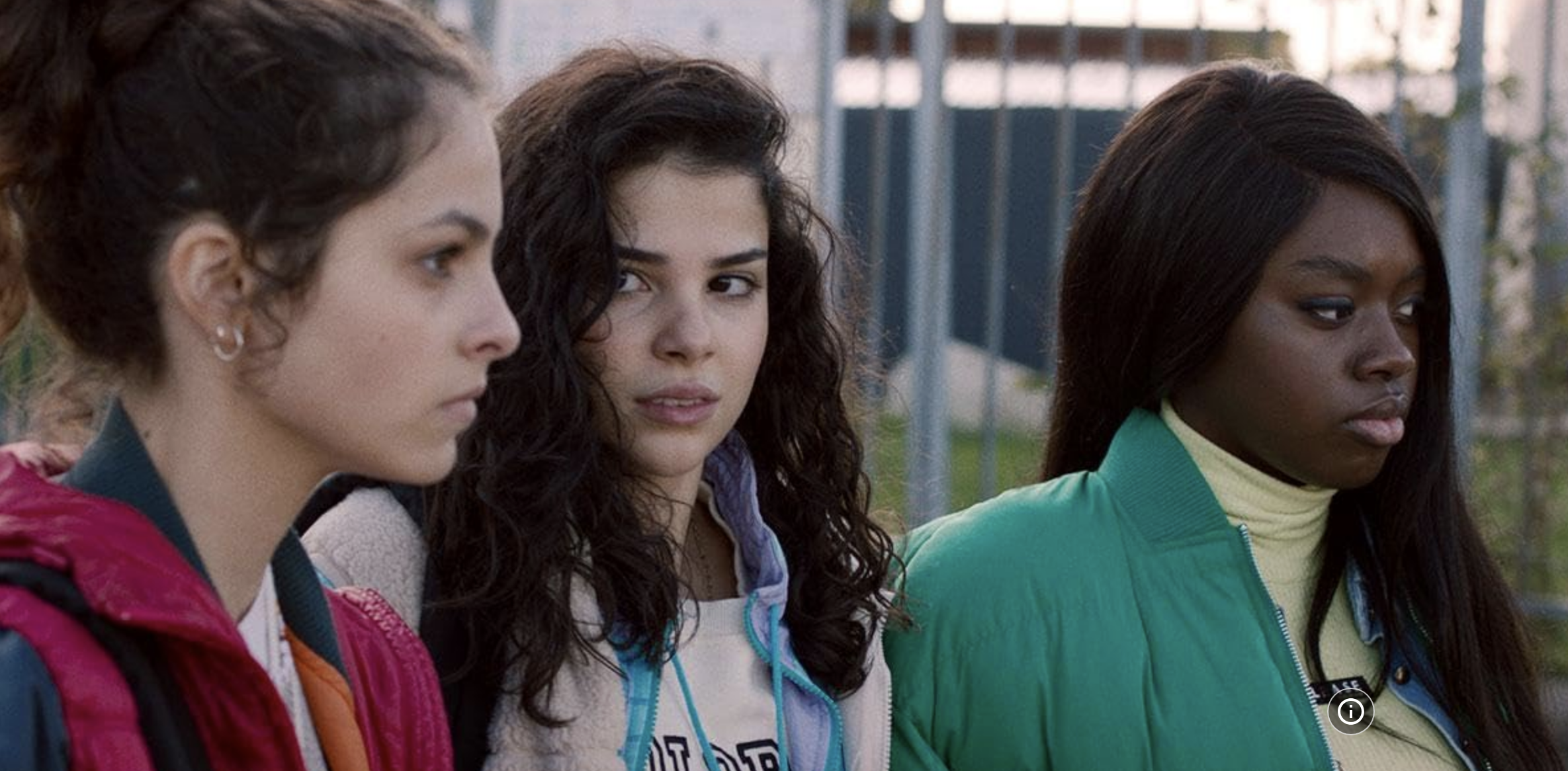TIFF '23: The Origin of Our Discontents
 Tuesday, September 12, 2023 at 11:14PM
Tuesday, September 12, 2023 at 11:14PM  Aunjanue Ellis-Taylor in "Origin"
Aunjanue Ellis-Taylor in "Origin"
Dealing with complex sociological issues in cinema is tricky. The risk of didacticism is hard to avoid, but abstraction can also be the enemy of clarity, especially when the filmmakers want to posit movies as an instrument of change, a spike of awareness. Writing about this type of film, I'm often confronted with inner conflicts about how to approach criticism. It's tempting to celebrate cinema that confirms one's worldview and political alignments. But does that alone make for a good film? Many films at this year's TIFF confront issues of systematized injustice on the basis of race, gender, sexuality, and other forms of identity. Two such films, Ava DuVernay's Origin and Nora El Hourch's Sisterhood present distinct visions though a striking sense of confrontation unites them...
ORIGIN, Ava Duvernay
Whatever one might end up thinking about Origin, nobody should question Ava Duvernay's sheer ambition. Adapting the nonfiction book Caste: The Origins of Our Discontents by Isabel Wilkerson, the filmmaker took an approach that threads personal history through historical episodes – looking at Nazi Germany, the American Jim Crow policies, and India's caste system. The director puts forward the writer's arguments while investigating the process of how they emerged, developed, gestated into their final form. Simultaneously, the dramatized story is one of overwhelming loss, with a series of deaths pulling the rug out from under Wilkerson. Origin is thus as much about systems of oppression as it is about one woman's journey to survive her sorrow.
In this regard, much of the exercise rests on Aunjanue Ellis-Taylor's shoulders, her ability to make sense of an internal process externalized. The Oscar nominee does this beautifully, reaching for the stars with visceral purpose, a cerebral tinge keeping the character faithful to its role within and without. Furthermore, she hones in on the screenplay's presentational tone while inflecting her delivery with the weight of complex characterization, even when simply narrating Wilkerson's prose over restaged history. Her performance masters the joining of theory and emotion that much of Origin strains to achieve, culminating in breathtaking passages that will draw tears out of rocks.
But, as engrossing as it can be at times, there's a reticence about the picture that keeps it from fully clicking. Presentational works can sometimes feel like sermons, lessons to be imparted rather than a dialogue of ideas between the screen and the viewer. So many of the arguments in Origin are verbalized directly, whether in reading or flat-footed discussion. There's authenticity here, the truth of a writer's process. But there's also the problem that writing is the least cinematic of all creative forms. As Wilkerson explains herself and talks with others, amazing ideas manifest though they're not articulated for the camera beyond direct illustration.
Origin may be a conversation starter, but the experience of watching it isn't conversational, its conclusions neatly formalized. That DuVernay doesn't let that detract her from pushing forward into pictorial splendor, emotion-driven editing patterns, and musical excess is commendable. It does, however, result in those touches rubbing abrasively against the project's overall shape, a gilding of the lily that can often be alienating. Considering all this, perhaps Origin would have been greater as a documentary adaptation of Caste or a more straightforward examination of Isabel Wilkerson's life and work.
As it stands, it's neither and both. Oh, how I want to praise what could have been Ava DuVernay's magnum opus. It's so massive in scale and intention, so noble, and so drunk on the possibility that moving pictures can change the world – essayistic cinema finally given the scope of an epic and all the quandaries of narrative. Yet, thinking back to the film, I can't say any of this elevates Origin above a sturdy piece of emotional expiation doing double duty as introduction to Wilkerson's work, and a tool for teaching. In this case, I must concede to that critical cliché: Wouldn't one's time be better spent just reading the book?
 The stars of "Sisterhood"
The stars of "Sisterhood"
SISTERHOOD, Nora El Hourch
Putting theory into narrative practice, Nora El Hourch's feature debut is a firebrand-hot object. The film concerns a group of three teen friends, girls who've been inseparable since childhood and whose marginalized identity as descendants of immigrants has only strengthened their bond. It might also undo it altogether. Two of them, Djeneva and Zineb, live in a so-called rough neighborhood where incomes are low, and every body is racialized. Meanwhile Amina enjoys the privileges of a higher socio-economic class and white-passing appearance.
To further intensify this disparity, Amina's father has done plenty to disentangle her from their heritage, insisting she not learn Arabic or frequent the places the family came from before achieving their current wealth. He even pushes Amina to leave her old friends behind, and pressuring her to socialize with the preppy white youth. All this combines with the intersection of other issues, cracking fissures over the girls' union. The breaking point, however, stems from Amina's relative security from the consequences that can and will befall her companions.
After her older brother's friend accosts Zineb, the trio sets up a trap to film the harassment. While the video rests in Amina's phone for a while, she posts it online, anonymously and without Zineb's consent. Unwittingly, it sparks the vengeful wrath of the implicated man. And so, what starts as a minor infraction grows gigantic, like a snowball turning into an avalanche. While wanting to do what's right, Amina seems incapable of fully understanding the different experiences of Zineb and Djeneba.
Despite harrowing developments, El Hourch's film still finds time for graceful notes, like a starry night sky as the mark of one girl's desperate disassociation. Laughter, too, can emerge from the darkness. Take a telling incident when Amina forgets to take off her shoes inside her friend's house or her general out-of-place awkwardness, the tragicomic reality of being between worlds and feeling like you belong nowhere.
There are no easy answers here, and there honestly shouldn't be. Better to question and make the audience think for themselves, struggle to differentiate the levels of morality at play, each person's stakes, and how victims can become heroines in a world where there's no such thing as a hero. In Sisterhood, women, especially women of color, are made to bear the onus of responsibility, even when they're the ones disempowered. To acknowledge these horrors and their intersections is a brilliant starting point. Keeping openness of interpretation at the end allows for an active experience on the viewer's part, a true provocation demanding a reaction. The solution is not for the film to provide but for you to figure out beyond the theater.
On a final note, Nora El Hourch's debut is a cross-generational acting showcase, featuring the best ensemble I've seen at TIFF '23. As Amina, Léah Aubert is sensational, already honored as one of the festival's Rising Stars. She's able to telegraph the character's conflicted notions, telegraphing them through the dense haze of teen angst. If possible, her partners in crime are even more remarkable, with Médina Diarra deserving of MVP status as Djeneba. The confrontation between the two friends in the aftermath of targeted vandalism is astounding, but the matter-of-fact acceptance with which she utters, "I don't expect anything anymore," might be the best of the best. Then there's Bérénice Bejo and Mounir Margoum as Amina's parents, offering support from the sidelines until they're called to vivisect their character's motivations. They open so beautifully, with a slash of pain that's hard to witness yet essential to behold. Indeed, Sisterhood is essential viewing.


